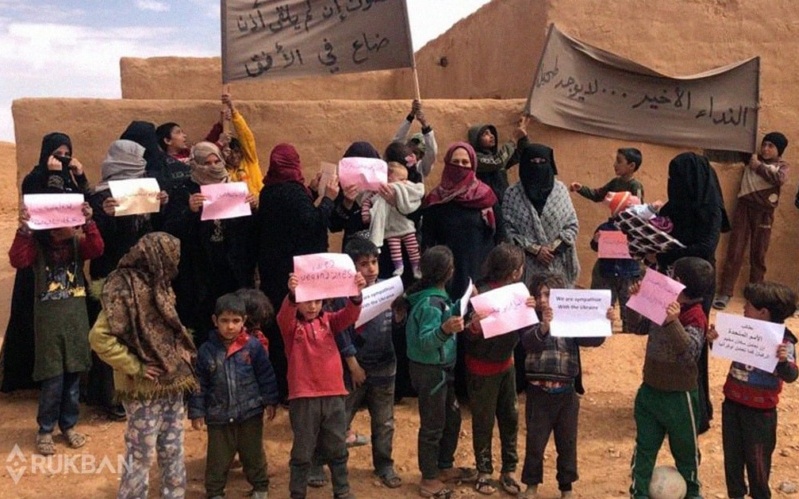Women and children protest conditions in Rukban camp in southeast Syria on the Jordanian border, March 23, 2022 (Rukban Network)
At one point, the Rukban camp in southeast Syria, in a barren area near Jordan’s border, hosted about 75,000 civilians who were displaced by the Islamic State’s attacks in central Syria in 2015.
A siege by the Assad regime and Russia since autumn 2018 has brought residents to the point of starvation, prevented medical care beyond a rudimentary clinic with few supplies, and deprived the camp of clean water and adequate shelter.
The pressure, compounded by Jordan’s closure of the border in summer 2016, have forced many residents to accept transfer back to central Syria, despite the threat of interrogation, detention, loss of property, and even “disappearance”. But about 12,000 civilians hang on in Rukban, hoping for assistance to help them survive.
See also Rukban Camp’s Residents Face Renewed Threat of Starvation
While the regime and the Russians are the main instigators of Rukban’s suffering, the US has been an accomplice. Rukban is within a 55-km (34-mile) security zone around the American base at Tanf, on the Iraqi border, but for years US officials have refused to aid the imperilled residents. Focused on checking Iranian influence and wary of antagonizing the Russians, Washington’s bureaucrats have vetoed proposals to deliver food and supplies.
After 2 Years, Displaced Syrians in Rukban Camp Get Medical Treatment
In January, the Tanf base finally accepted some Rukban residents for urgent medical treatment, with an international medical team entering the camp days later. But at the same time, shortages of food have become more intense, with supplies of wheat flour exhausted.
Syria Notes has interviewed Robert Ford, the US Ambassador to Syria from 2011 to 2014, about the American failure of responsibility.
We post an extract from the interview. For the full version, readers can e-mail Syria Notes at editor@syrianotes.org.
“We’re Watching People Suffer”
SYRIA NOTES: We wanted to ask you why you focused on Rukban in particular.
ROBERT FORD: I guess the reason is Syria is an enormous human tragedy. The scale is unimaginable. And for the most part, the Americans have been completely ineffective at protecting civilians.
Rukban is one place where, without a whole lot of effort, the Americans could protect, I don’t know what the number there now is, maybe seven or eight thousand people. And all it takes is a decision to do it. The resources are there. And it’s just outrageous to me that they would watch this suffering and just say, well, Assad should take care of it, knowing full well that Assad is not going to do it, and that if Assad approaches the area with armed force, the Americans are going to shoot at him anyway.
Rarely do I see this level of American hypocrisy. It’s normal for the Americans to be hypocritical. I think most powers are. But but in this case, it’s particularly egregious.
Your 2019 article [on Rukban in Just Security] focused on law. Was that because you saw the clear case, or did you think that was a more effective way of arguing than on humanitarian grounds?
I think the reason I did that was to try to shame the Americans who are constantly complaining about the violations of international humanitarian law by other countries, including the Syrian government.
And I wouldn’t want to equate what the Syrian government does with what the American government is doing in Rukban — that would be preposterous — but at the same time, the Americans have a sort of an image of themselves, still, of the GIs liberating Europe and giving chocolate to the starving kids in France or Germany. And in fact, we’re watching people suffer. We’ve seen kids freeze to death out in Rukban. And the Americans just watch. They don’t do anything.
Did you get any response from anyone at all?
Zero. I didn’t get anything from the Trump administration. The article did get read by a Washington Post reporter, Josh Rogin, and Josh went after James Jeffrey [then the US Special Representative for Syria] at a conference on national security issues in Aspen, Colorado. And Jim had to fall back and say something like, “Well, we’re not responsible because we’re going to leave someday”, as if that’s germane to the legal argument.
The response that we got that time in 2019 from the UK Government was along the lines of “because we’re not governing, therefore we’re not an occupation”.
But that’s not how it works. The Rukban article I wrote with a brilliant young Yale Law School grad, Carolyn O’Connor. So she wrote a paper, the legal arguments of which are are summarised in the Just Security piece, which we co-authored. The key point is that the definition of an occupying power is that you have effective control. It’s about ability, not whether or not you do it.
And it’s the Americans that are in control of the space. When the Russians and the Syrians and their Iranian goonish allies tried twice to get into the space, the Americans blasted them to hell. So the Americans control it and do so very consciously. You know, they’re not there because of Rukban, they’re there blocking the Iranians from using the road.
You see some people argue that quite openly. But then if you ever have a military person talking about it, they will refer to the anti-ISIS mission.
That’s because the Americans’ original basis back in Autumn of 2014 was an Article 51 letter to the Secretary General saying we’re intervening in Syria for self-defence, because ISIS is threatening us. And so the main thrust of the American effort is not down in Tanf, it’s up in the northeast. But the Americans now are into some kind of strange geopolitical mission in Syria writ large, and Tanf is part of that.
For the full interview, e-mail Syria Notes at editor@syrianotes.org.

